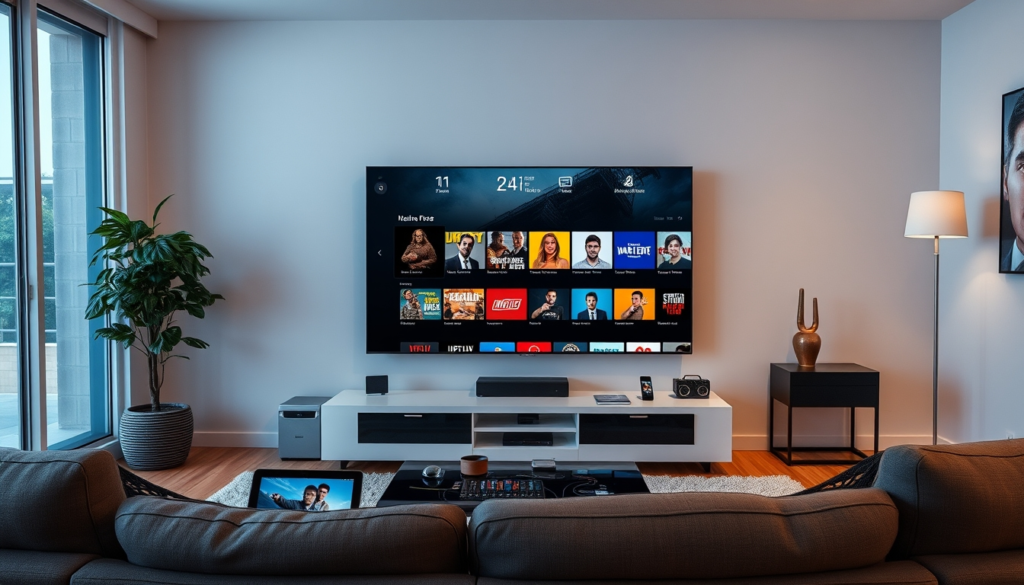- Key Takeaways
- Understanding IPTV Technology
- The Basics of IPTV
- How IPTV Differs from Traditional TV
- Key Components of IPTV Systems
- How IPTV Streams Content
- Types of IPTV Services
- Benefits of IPTV for Different Audiences
- Technical Requirements for IPTV
- Challenges and Considerations
- Popular IPTV Providers
- Conclusion
- Frequently Asked Questions
IPTV, or Internet Protocol Television, is a way to watch TV by streaming it over the internet instead of using traditional cable. So how does iptv work? This technology allows viewers to access a variety of content, from live TV to video on demand, on multiple devices like smart TVs, smartphones, and tablets. IPTV is becoming increasingly popular because it offers more flexibility and options for viewers.
Key Takeaways
IPTV streams TV shows and movies over the internet, not through cable or satellite.
Viewers can watch live TV, video on demand, and time-shifted media with IPTV.
IPTV works on various devices, including smart TVs, tablets, and smartphones.
A good internet connection is essential for a smooth IPTV experience.
IPTV offers unique features like pausing, rewinding, and recording live TV.
Understanding IPTV Technology

The Basics of IPTV
IPTV, or Internet Protocol Television, is a way to deliver TV content over the internet. Unlike traditional TV, which uses satellite or cable, IPTV uses the internet to stream content. This allows for more flexibility and a wider range of content. IPTV services can be used on various devices like smart TVs, smartphones, tablets, and computers.
How IPTV Differs from Traditional TV
Traditional TV relies on broadcasting signals through satellite or cable networks. In contrast, IPTV uses the internet to send TV signals. This means that IPTV can offer features like video on demand (VoD) and live streaming. Additionally, IPTV often provides interactive features such as pause, rewind, and fast-forward, which are not typically available with traditional TV.
Key Components of IPTV Systems
IPTV systems consist of several key components:
Content Acquisition: This involves obtaining the TV shows, movies, and other content that will be streamed.
Encoding: The content is encoded into a digital format that can be transmitted over the internet.
Content Delivery Networks (CDNs): These networks distribute the content to users efficiently.
Set-Top Boxes: These devices decode the digital signals so they can be displayed on a TV or other screen.
IPTV broadcasts started gaining usage during the 2000s alongside the rising use of broadband-based internet connections. It is often provided bundled with internet access services by ISPs to subscribers and runs in a closed network.
IPTV is distinct from over-the-top (OTT) services, which are based on a direct one-to-one transmission mechanism. IPTV methods have been standardized by organizations such as ETSI. IPTV has found success in some regions: for example, in Western Europe in 2015, pay IPTV users overtook pay satellite TV users. how does iptv work?
How IPTV Streams Content
Content Acquisition and Encoding
IPTV providers gather content from various sources, including live TV broadcasts, on-demand videos, and time-shifted media. This content is then encoded and compressed to ensure efficient transmission over IP networks. Encoding converts video and audio signals into digital data that can be easily transmitted over the internet.
Content Delivery Networks (CDNs)
To deliver content efficiently, IPTV uses Content Delivery Networks (CDNs). CDNs are a system of distributed servers that deliver web content to a user based on their geographic location. This helps in reducing latency and buffering, ensuring a smooth streaming experience.
Decoding and Playback on User Devices
When a user selects content, it is streamed to their device using the IP network. The content is then decoded and played back on various devices, including smart TVs, smartphones, tablets, and computers. IPTV systems offer interactive features such as pause, rewind, and fast-forward, enhancing the viewing experience. how does iptv work?
Types of IPTV Services

Live IPTV
Live IPTV is similar to traditional TV, allowing users to watch live broadcasts in real-time. This service is popular for streaming live events such as sports, news, and special events.
Video on Demand (VoD)
Video on Demand (VoD) lets users choose and watch videos whenever they want, rather than following a set schedule. Services like Netflix and Amazon Prime Video are well-known examples of VoD.
Time-Shifted Media
Time-shifted media services allow users to watch previously broadcasted TV shows at their convenience. This includes features like catch-up TV and start-over TV. how does iptv work?
Benefits of IPTV for Different Audiences

Internet Protocol Television (IPTV) offers a range of benefits tailored to various audiences. Whether you’re a sports enthusiast, an international viewer, or part of a family with diverse viewing needs, IPTV has something for everyone.
Technical Requirements for IPTV
Internet Speed and Bandwidth
To enjoy IPTV, you need a fast and stable internet connection. A minimum speed of 20 Mbps is often recommended for a smooth experience, especially if you want to watch high-definition (HD) content. Here’s a simple table to help you understand the requirements:
Content Type | Minimum Speed |
|---|---|
SD Quality | 3-5 Mbps |
HD Quality | 10-20 Mbps |
4K Quality | 25 Mbps or more |
IPTV Set-Top Boxes
An IPTV set-top box is a device that connects your TV to the internet, allowing you to stream IPTV content. These boxes decode the digital signals and display them on your TV. Some popular set-top boxes include Roku, Amazon Fire TV, and Apple TV.
Compatible Devices and Applications
IPTV can be watched on various devices, not just your TV. You can use:
Smartphones
Tablets
Computers
Smart TVs
Additionally, there are many apps available that support IPTV, such as VLC Media Player, Kodi, and dedicated IPTV apps provided by service providers.
Ensuring you have the right equipment and a good internet connection is crucial for a seamless IPTV experience.
how does iptv work?
Challenges and Considerations
Quality of Service and Reliability
IPTV services need a strong, high-speed internet connection to work well. If the network isn’t good enough, users might face buffering or interruptions. Providers must invest in better networks to keep up with the growing demand for IPTV.
Legal and Licensing Issues
IPTV providers have to follow different laws and rules in each region. They need to make sure they respect copyright laws and privacy rules. This can be tricky, especially for those offering services in many countries.
User Privacy and Data Security
Keeping user data safe is very important. IPTV providers must protect user information from hackers and other threats. They need to use strong security measures to keep user data private.
IPTV services face many challenges, but with the right investments and strategies, they can offer a great viewing experience.
Wide Variety of Providers
There are many IPTV providers, which can make it hard for users to find reliable ones. Some providers might not offer good quality or customer service. Users need to be careful when choosing a provider.
Different Formats
IPTV content comes in many formats, which can cause technical issues. Providers need to make sure their content works on all devices, from smartphones to smart TVs.
Availability of Pirated Content
Piracy is a big problem for IPTV. It hurts content creators and can get users in trouble with the law. Providers need to find ways to stop pirated content.
Network Improvements
To deliver high-quality content, IPTV needs a strong internet connection. In areas with poor internet, this can be a big challenge. Providers need to invest in better networks to meet user expectations.
Rising User Demand
More people are using IPTV, which means providers need to keep improving their services. They need to invest in new technology and get more content to keep users happy.
Subscription-Based Services
IPTV often requires users to pay a subscription fee. This can be a challenge because there are many options out there. Providers need to offer good content and competitive prices to keep their customers.
Competition with Traditional TV Providers
IPTV has to compete with regular cable and satellite TV. It’s hard to get users to switch to IPTV because they are used to traditional TV. IPTV providers need to offer something special to attract users.
Regulatory and Legal Considerations
IPTV services have to follow many rules and laws. This can be hard, especially for providers working in different countries. They need to make sure they follow all the rules to avoid legal problems.
Popular IPTV Providers

Major Global IPTV Providers
Several major companies dominate the IPTV market globally. These include well-known names like Netflix, Google, Apple, and Microsoft. Additionally, Sony offers video streaming services via smart TVs and internet-enabled devices. Other significant players are AT&T, Roku, Hulu, and YouTube. These providers offer a wide range of content, from movies and TV shows to live sports and news. how does iptv work?
Regional IPTV Services
In different parts of the world, regional IPTV services cater to local audiences. For instance, in South Africa, [iptvsubscription.co.za](https://iptvsubscription.co.za) is a leading provider, offering over 90,000 channels and VODs in high quality. This service allows subscribers to access popular South African channels and international content through a single subscription, making it the top choice for premium streaming in 2024.
Emerging IPTV Platforms
New IPTV platforms are continually emerging, offering innovative features and content. Some of these include:
Apollo Group TV
FalconTV
SelectTV
Best Cast TV
Comstar.tv
Xtreme HD IPTV
These platforms often specialize in specific types of content or offer unique viewing experiences, attracting niche audiences and expanding the IPTV market further.
Looking for the best IPTV providers? Check out our top picks and find the perfect service for your needs. With thousands of channels and on-demand content, you’ll never miss your favorite shows or sports events. Ready to upgrade your TV experience? Visit our website now!
Conclusion
IPTV is changing the way we watch TV by using the internet to deliver shows and movies. It offers a lot of choices, like live TV, video on demand, and the ability to pause or rewind. This makes it great for sports fans, movie lovers, and families who want to watch different things at the same time. With IPTV, you can watch your favorite content on many devices, like your TV, phone, or computer. As technology keeps getting better, IPTV will likely become even more popular, giving us more ways to enjoy our favorite shows and movies. how does iptv work?
Frequently Asked Questions
What is IPTV?
IPTV stands for Internet Protocol Television, which means TV services are delivered over the internet instead of through traditional cable or satellite. You can watch live TV, on-demand videos, and more using IPTV. how does iptv work?
How does IPTV work?
IPTV works by sending TV programs and videos over the internet. When you select a show to watch, the IPTV provider sends the video in small data packets to your device, where it gets decoded and displayed on your screen. how does iptv work?
Do I need a special device to watch IPTV?
To watch IPTV, you might need a set-top box if your TV can’t read internet signals directly. Some smart TVs, computers, and mobile devices can stream IPTV without extra equipment. how does iptv work?
What are the types of IPTV services?
There are three main types of IPTV services: Live IPTV for watching real-time broadcasts, Video on Demand (VoD) for watching videos whenever you want, and Time-Shifted Media for watching previously aired shows at your convenience. how does iptv work?
Is IPTV legal?
IPTV itself is legal, but it depends on the source of the content. Using services that have proper licenses to stream content is legal, while accessing pirated streams is illegal. how does iptv work?
What internet speed do I need for IPTV?
For a smooth IPTV experience, you generally need a stable internet connection with at least 5 Mbps speed for standard definition and higher speeds for HD or 4K content. how does iptv work



